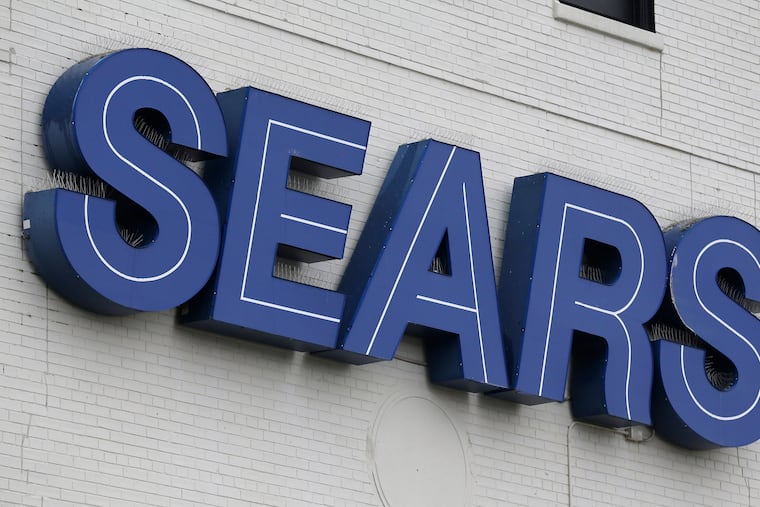The last Sears store in New Jersey is closing
Once the store closes, residents of the Philadelphia region will need to travel hundreds of miles to Braintree, Mass., to reach the nearest operating Sears.

The Philadelphia region will soon be without a single Sears department store location as the company’s last outpost in New Jersey is set to close.
Located in Jersey City’s Newport Centre mall, the location — also known as store No. 1044 — announced its closing in a Facebook post recently. The post encouraged shoppers to “stop in today for great bargains,” and included a photo of signage advertising discounts of up to 70%.
It was not immediately clear when the location, which opened its doors in 1987, would close for good. Transformco, Sears’ parent company, did not immediately respond to a request for comment.
The store, however, has been the only Sears location in the Garden State since 2020, and is one of a dozen Sears stores nationwide. The company’s last large store in Pennsylvania closed in 2022 in Willow Grove, and its final Keystone State shop, a stripped-down location in Camp Hill, closed last year.
Once the New Jersey store closes, residents of the Philadelphia region would need to travel hundreds of miles to Braintree, Mass., to reach the nearest operating Sears.
That footprint is a far cry from Sears’ glory days, when it had thousands of locations across the country — even running a sprawling mail-order complex on Roosevelt Boulevard in Philadelphia that closed in the 1990s. But since the advent of online shopping, the brand has faced a decline in popularity and revenue, and it filed for bankruptcy in 2018.
Since then, its presence has all but disintegrated, leading to the end of a retail era.
Sears’ Philadelphia lineage
Since its founding in 1893 as Sears Roebuck & Co., Sears grew quickly, thanks in part to its voluminous print catalog, which had hundreds of pages of items available for order. In the decades after its founding, the company continued to expand, and Sears leaders eventually chose Philadelphia to serve as a hub for distribution of its catalog’s products.
The result was Philly’s own Sears Tower — officially, the Sears Distribution Center — a sprawling neo-Gothic brick building with a 14-story clock tower on Roosevelt Boulevard near Adams Avenue in the Northeast. Completed in 1920, it would go on to become the company’s second-largest plant, employing thousands of Philadelphians at the peak of its operations.
But in 1993, Sears stopped publishing its catalog, and subsequently shut down its distribution operations in Philly. That year, the main building and 48 acres of the property it sat on were sold to the Rubin Organization, a prominent local developer. And 72 additional acres of the property went to auto parts distributor Cardone Industries.
Despite historical preservationists’ efforts to save the clock tower, it ultimately was demolished in October 1994. According to Inquirer reports from the time, an estimated 50,000 people attended the implosion.
Today, the center’s former power station serves as a reminder of Sears’ former presence — as well as a billboard for Home Depot, one of several retail stores that now occupy the site.
Bankruptcy and decline
Sears’ presence declined substantially throughout the 2000s, with the company facing intense competition from fellow big-box stores such as Walmart and online retailers such as Amazon. In 2005, Eddie Lampert, a billionaire hedge fund operator, merged the company with Kmart under the Sears Holdings Corp. banner.
Following a peak profit of $1.5 billion in 2006, the company quickly began losing revenue. In 2010, it was no longer profitable, and it would go on to lose $10.4 billion between 2011 and 2016, Investopedia reported.
During that time, Sears also sold off a number of assets, including its Land’s End and Craftsman brands. In 2018, it filed for bankruptcy protection and was acquired by Transformco, a privately held company affiliated with Lampert.
Transformco’s strategy, The Inquirer reported at the time, was to create a more diverse portfolio with a limited number of large flagship stores, and a larger number of smaller stores. That plan included putting Sears Hometown Stores and Home & Life stores in areas that were previously home to larger Sears locations.
Sears exits Pennsylvania
By 2021, Sears’ lone full-service location in Pennsylvania — an outpost at the Willow Grove Park mall in Montgomery County — was clinging to life. By that November, the store displayed posters advertising markdowns of up to 60%, and squeezed two floors of merchandise into one.
In early 2022, its operations came to an end. In a statement to PennLive, Scott Carr, president of real estate for Transformco, said that “there is strong redevelopment for this [Willow Grove] site.”
“We intend to reinvigorate and maximize the value of real estate to meet the needs of the Willow Grove market,” Carr said.
With the store’s closure, the only remaining Sears location in Pennsylvania was a bare-bones store at Capital City Mall in Cumberland County, which sold only mattresses and appliances toward the end of its run. It closed last year, capping a four-decade run at that mall.
In comparison to Sears’ decline, Amazon has seen substantial growth in the state over the last several years. As of 2022, it had nearly 60 warehouses in the Philadelphia area, many of which began operations during the COVID-19 pandemic, The Inquirer reported.